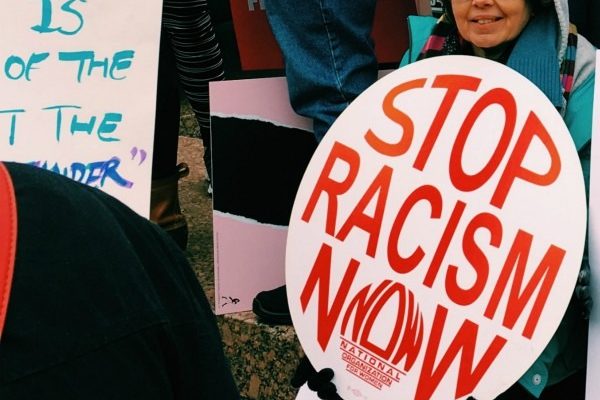Learn about the benefits of constructing a multi-year internship from a MLIS student's perspective.

Theory in practice III: Moving from systemic racism to anti-racism in Ontario public libraries
In this three-part series, Amber Matthews unpacks the backlash against anti-racism dialogue and makes the case that those of us who work in the library sector need to think deeply about institutional biases.
In Part I, Amber addressed the media response to conversations about white privilege that happened during Super Conference 2020. In Part II, she discussed the need to explicitly acknowledge deeply embedded racist thinking in order to move towards systemic change in public libraries. In this final installment, Amber argues that libraries are racialized spaces and that library staff need to recognize this reality in order to make a productive commitment to constructing equitable social structures.
Part III: Anti-racism in practice
Over the last three months, the world has seen a pronounced shift towards racial justice amid calls to address inequities that have been built into society and replicated by its institutions. The resounding message is that there is a crisis of inequity in Canada (and around the world), and that we all have a larger part to play in fostering racial justice. Police violence and disproportionate health impacts felt by the COVID-19 pandemic are the most visible effects. However, like the police and health care system, libraries are a part of a system of structural racism, inequity and oppression that runs deep in Canada.
Anti-racism includes direct work to redress the real effects of inattention to race on people in libraries.Libraries have a long history of envisaging that information and our spaces exist outside of race and power structures such as systemic racism. Institutional policies tend to assume that the material space of libraries is neutral, and conceives of our work as both colour-blind and diverse; yet, the field is reluctant to accept that the predominance of whiteness in its history, workforce, programs and services, collections and organizing structure renders it incapable of being neutral or colour-blind. In fact, the reverse is more likely true: current approaches and policies are rooted in an idea of libraries as historical and contemporary repositories and reflections of white culture and normativity. Many of us have grappled over the last few months about what it means to be anti-racist. Simply, it means accepting and holding the position that races are both equal and deserving of different treatment to redress injustice and mistreatment.
Whereas contemporary legal and social justice dialogue often aims to redistribute opportunities, anti-racism scholarship highlights that inequity is structural, and rooted throughout all our work and policies. Thus, any meaningful response to a structural problem must also be structural to be effective. This necessitates a conscious shift to hold ourselves and our institutions accountable for addressing the tacit connections between historical ways of doing our work and the resulting systemic inequity.

them incapable of being neutral or colour-blind.
Like many other social institutions, libraries have recently made strong commitments and declarations of anti-racism. For example, in the days and weeks following the resurgence in Black Lives Matter protests, many developed and shared anti-racism and Black history reading lists. Others also took part in wider global social media campaigns such as #BlackOutTuesday in solidarity with protesters and Black communities. However, we must be clear about what these commitments mean, and what appropriate next steps to take to fulfill our stated objectives. On the whole, a commitment to antiracism compels us to acknowledge historical inequity, disentangle ourselves from the notion that our work is neutral, and realign and reconstruct our policies and ideas in accordance with principles of racial justice. This means reckoning with the ways in which race and white cultural normativity have informed our collective ideas about the library and who it aims to serve.
Most importantly, anti-racism is a participatory and community-based process that is based in practices of humility and understanding. Which is to say that we cannot address systemic racism without engaging and supporting those who suffer its ill effects. However, this is not an easy or straightforward process. Though systemic racism is a structure of privilege that reinforces white cultural normativity, there is no unified experience or single voice. There are many experiences of marginalization and a complex relationship between power and privilege underpinning both interpersonal and institutional relationships. Libraries must be willing to listen and act on these accounts.
While crucially important, this needn’t feel like daunting or impossible work. In fact, libraries across Canada have already demonstrated an ability and willingness to engage in the kind of introspective work that anti-racism begs. For example, staff and board members at the Thunder Bay Public Library have included addressing systemic racism as part of their organizational mandate and have engaged in a series of fruitful conversations with their community on how community members have experienced racism in library spaces and interactions. Another example is the collective response from the library community to calls to action by the Truth and Reconciliation Commission of Canada in 2015. The CFLA-led Truth and Reconciliation process of participatory and action-oriented self-examination of the library sector as whole led to a series of recommendations that exemplify our capacity to engage in anti-racism praxis.
Anti-racism as a practice and methodology allows us to anchor our work in both a theoretical and practical approach to create truly inclusive spaces and communities. In practice, this commitment looks to address the massive gap in our scholarship on information needs and wants of racial, cultural and ethnic library users. It aims to better understand what social and cultural inclusion might look like in practice. Finally, it must include direct work to redress the real effects that inattention to race has on the people in libraries. This includes everything from examining our library school curriculum to identify how the predominant focus on practical learning creates the potential for an ill-equipped workforce, to implementing strong measures to address hostile work environments where race and microaggressions are often minimized and ignored.

Anti-racist praxis rejects the idea of the library as neutral and reimagines it as a just and inclusive space. It gives new possibilities for community engagement both within and outside current library policies and ideas. Although it casts light on the schism between how we celebrate the social and cultural aspects of diverse communities while ignoring the contraindications of these principles in our spaces and practices. It also points us toward the host of beneficial qualities for individuals and communities that make them worth salvaging in a time of rapidly increasing division and discord.
In doing so, we make actual and sustained progress to deconstruct ideas and practices that tacitly support racial and other forms of inequity.
Photo by Simone Fischer on Unsplash
References
Government of Ontario. A better way forward: Ontario’s 3-year anti-racism strategic plan. Retrieved from https://www.ontario.ca/page/better-way-forward-ontarios-3-year-anti-racism-strategic-plan
Government of Canada. Building a foundation for change: Canada’s anti-racism strategy 2019–2022. Retrieved from https://www.canada.ca/en/canadian-heritage/campaigns/anti- racism-engagement/anti-racism-strategy.html
Kendi, Ibram X. How to be an antiracist. New York: One World, 2019.
Levy. Sue Ann. “Librarians denounce white privilege.” Toronto Sun. January 30, 2020.
Amber Matthews is a Library and Information Science (LIS) doctoral student at Western University and holds a master’s degree in LIS. Her research examines systemic racism in public libraries and its impacts on racialized youth in Canada. She is also a member of the Open Shelf editorial team.


